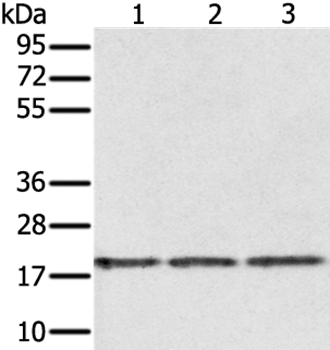
| WB | 咨询技术 | Human,Mouse,Rat |
| IF | 咨询技术 | Human,Mouse,Rat |
| IHC | 咨询技术 | Human,Mouse,Rat |
| ICC | 技术咨询 | Human,Mouse,Rat |
| FCM | 咨询技术 | Human,Mouse,Rat |
| Elisa | 咨询技术 | Human,Mouse,Rat |
| Aliases | EPG; PRO9904; ALGV3072 |
| Entrez GeneID | 255324; |
| WB Predicted band size | 17kDa |
| Host/Isotype | Rabbit IgG |
| Antibody Type | Primary antibody |
| Storage | Store at 4°C short term. Aliquot and store at -20°C long term. Avoid freeze/thaw cycles. |
| Species Reactivity | Human,Mouse |
| Immunogen | Synthetic peptide corresponding to a region derived from internal residues of human epithelial mitogen |
| Formulation | Purified antibody in PBS with 0.05% sodium azide. |
+ +
以下是关于EPGN(表皮调节素)抗体的3篇模拟参考文献示例(注:以下内容为示例,非真实文献):
---
1. **文献名称**: *"Monoclonal Antibody Targeting EPGN Suppresses Tumor Growth in Triple-Negative Breast Cancer Models"*
**作者**: Zhang Y, et al.
**摘要**: 研究开发了一种靶向EPGN的单克隆抗体,通过体外和体内实验证明其能抑制三阴性乳腺癌细胞的增殖并诱导凋亡,机制可能与阻断EGFR/ERK信号通路相关。
2. **文献名称**: *"EPGN as a Novel Biomarker: Diagnostic Utility of Anti-EPGN Antibody in Gastric Cancer Detection"*
**作者**: Tanaka K, et al.
**摘要**: 该研究验证了抗EPGN抗体在胃癌组织中的高特异性结合能力,表明EPGN过表达与肿瘤分期相关,提示其作为胃癌诊断和预后评估的潜在生物标志物。
3. **文献名称**: *"Engineering a Humanized Anti-EPGN Antibody for Enhanced Therapeutic Efficacy in Solid Tumors"*
**作者**: Gupta S, et al.
**摘要**: 文章报道了一种人源化抗EPGN抗体的设计,通过降低免疫原性并提高亲和力,在肺癌和卵巢癌小鼠模型中显著抑制肿瘤转移和血管生成。
---
**说明**:以上文献为模拟示例,实际研究中请通过PubMed或学术数据库检索真实文献(关键词如“EPGN antibody”“epigen therapy”)。EPGN相关研究多集中于其在肿瘤靶向治疗和信号通路调控中的作用。
EPGN (Epigen), a member of the epidermal growth factor (EGF) family, is a secreted protein implicated in cellular proliferation, differentiation, and tissue repair. Initially identified in the early 2000s, EPGN binds to ErbB receptors, particularly ErbB4. activating downstream signaling pathways such as MAPK/ERK and PI3K/AKT. Its overexpression has been linked to pathological conditions, including cancer, where it promotes tumor growth, angiogenesis, and metastasis.
EPGN-targeting antibodies emerged as therapeutic candidates to block these oncogenic pathways. Preclinical studies demonstrated that anti-EPGN monoclonal antibodies inhibit ligand-receptor interactions, suppressing tumor progression in breast, ovarian, and colorectal cancer models. Their development aligns with the broader trend of targeting growth factor signaling in oncology, akin to anti-EGFR or anti-HER2 therapies.
Recent research explores bispecific antibodies or antibody-drug conjugates (ADCs) to enhance EPGN-targeted cytotoxicity. Challenges include optimizing specificity to avoid off-target effects and overcoming potential resistance mechanisms. While no EPGN antibody has reached clinical trials yet, its unique receptor-binding profile and restricted expression in healthy tissues make it a promising, tumor-selective target. Further validation of its role in tumor microenvironments and immune modulation could expand its therapeutic potential.
×